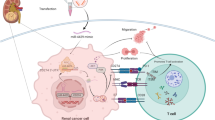Abstract
Purpose
MicroRNA-21 (miR-21) is one of the miRNAs that are frequently and highly overexpressed in tumor tissue of colorectal cancer (CRC) patients; however, only a little is known about its functional role in CRC.
Methods
We examined the expression level of miR-21 in 44 paired samples of tumoral and non-tumoral colon tissues diagnosed for CRC using TaqMan real-time PCR method. Furthermore, we used miR-21 inhibitor (anti-miR-21) to transient knockdown of miR-21 in DLD-1 colon cancer cells and examined the effects of miR-21 silencing on viability, apoptosis, chemosensitivity, cell cycle, and migration of DLD1 cells.
Results
The expression levels of miR-21 were significantly increased in CRC tumor tissue (P < 0.0001). Significant differences in miR-21 levels were observed also between CRC tissues of patients with CRC in different clinical stages: I vs. II (P = 0.033) and I vs. IV (P = 0.021). Kaplan–Meier analysis proved that the miR-21 expression levels are correlated to shorter overall survival of CRC patients (P = 0.0341). MiR-21 silencing in DLD1 cell line had no effect on the cell viability; however, when combined with chemotherapeutics (5-FU, L-OHP, and SN38), it contributed to the decrease of cell viability. Suppression of miR-21 decreased cell migration ability of DLD-1 cells by nearly 30 % (P = 0.016).
Conclusion
We have confirmed the overexpression of miR-21 in CRC samples and its correlation with advanced disease and shorter overall survival. These findings could be described in part by the fact that CRC cells with increased expression of miR-21 have higher migration ability.




Similar content being viewed by others
References
Kemp Z, Thirlwell C, Sieber O et al (2004) An update on the genetics of colorectal cancer. Hum Mol Genet 13:R177–R185
Slaby O, Svoboda M, Michalek J, Vyzula R (2009) MicroRNAs in colorectal cancer: translation of molecular biology into clinical application. Mol Cancer 8:102
Chang KH, Miller N, Kheirelseid EA et al (2011) MicroRNA signature analysis in colorectal cancer: identification of expression profiles in stage II tumors associated with aggressive disease. Int J Colorectal Dis 26(11):1415–1422
Hanahan D, Wienberg RA (2000) The hallmarks of cancer. Cell 100:57–70
Schetter AJ, Leung SY, Sohn JJ et al (2008) MicroRNA expression profiles associated with prognosis and therapeutic outcome in colon adenocarcinoma. JAMA 299:425–436
Slaby O, Svoboda M, Fabian P et al (2007) Altered expression of miR-21, miR-31, miR-143 and miR-145 is related to clinicopathologic features of colorectal cancer. Oncology 72:397–402
Zhang Z, Li Z, Gao C et al (2008) miR-21 plays a pivotal role in gastric cancer pathogenesis and progression. Lab Invest 88:1358–1366
Yan LX, Wu QN, Zhang Y et al (2011) Knockdown of miR-21 in human breast cancer cell lines inhibits proliferation, in vitro migration and in vivo tumro growth. Breast Cancer Res 13:R2
Papagiannakopoulos T, Shapiro A, Kosik KS (2008) MicroRNA-21 targets a network of key tumor-suppressive pathways in glioblastoma cells. Cancer Res 68:8164–8172
Selaru FM, Olaru AV, Kan T et al (2009) MicroRNA-21 is overexpressed in human cholangiocarcinoma and regulates programmed cell death 4 and tissue inhibitor of metalloproteinase 3. Hepatology 49:1595–1601
Wang ZX, Lu BB, Wang H et al (2011) MicroRNA-21 modulates chemosensitivity of breast cancer cells to doxorubicin by targeting PTEN. Arch Med Res 42:281–290
Zhu S, Si ML, Wu H, Mo YY (2007) MicroRNA-21 targets the tumor suppressor gene tropomyosin 1 (TPM1). J Biol Chem 282:14328–14336
Ziyan W, Shuhua Y, Xiufang W, Xiaoyun L (2010) MicroRNA-21 is involved in osteosarcoma cell invasion and migration. Med Oncol. doi:10.1007/s12032-010-9563-7
Liu M, Tang Q, Qiu M et al (2011) miR-21 targets the tumor suppressor RhoB and regulates proliferation, invasion and apoptosis in colorectal cancer cells. FEBS Lett 585:2998–3005
Torres A, Torres K, Paszkowski T et al (2011) Highly increased maspin expression corresponds with up-regulation of miR-21 in endometrial cancer: a preliminary report. Int J Gynecol Cancer 21:8–14
Lakomy R, Sana J, Hankeova S et al (2011) MiR-165, miR-196b, miR-181c, miR-21 expression levels and MGMT methylation status are associated with clinical outcome in glioblastoma patients. Cancer Sci. doi:10.1111/j.1349-7006.2011.02092.x
Goswami RS, Waldron L, Machado J et al (2010) Optimization and analysis of quantitative real-time PCR-based technique to determine microRNA expression in formalin-fixed paraffin-embedded samples. BMC Biotechnol 10:47
Varkonyi-Gasic E, Hellens RP (2011) Quantitative stem-loop RT-PCR for detection of microRNAs. Methods Mol Biol 744:145–157
Cho WC (2007) OncomiRs: the discovery and progress of microRNAs in cancers. Mol Cancer 6:60
Yan LX, Huang XF, Shao Q et al (2008) MicroRNA miR-21 overexpression in human breast cancer is associated with advanced clinical stage, lymph node metastases and patient poor prognosis. RNA 14:2348–2360
Valeri N, Gasparini P, Braconi C et al (2010) MicroRNA-21 induces resistance to 5-fluorouracil by down-regulating human DNA mutS homolog 2 (hMSH2). Proc Natl Acad Sci U S A 107:21098–21103
Sayed D, He M, Hong C et al (2010) MicroRNA-21 is a downstream effector of AKT that mediates its antiapoptotic effects via suppression of Fas ligand. J Biol Chem 285:20281–20290
Zhou JY, Ma WL, Liang S et al (2009) Analysis of microRNA expression profiles during the cell cycle in synchronized HeLa cells. BMB Rep 42:593–598
Liu M, Wu H, Liu T et al (2009) Regulation of the cell cycle gene, BTG2, by miR-21 in human laryngeal carcinoma. Cell Res 19:828–837
Acknowledgments
This study was supported by the Internal Grant Agency of Czech Ministry of Health NS 9814-4/2008, Czech Science Foundation (301/09/1115), and by the institutional research plan of Ministry of Health MZ0MOU2005, by The Ministry of Education, Youth and Sports for the project BBMRI CZ (LM2010004), and by the project “CEITEC – Central European Institute of Technology” (CZ.1.05/1.1.00/02.0068).
Conflict of interest
The authors declare that they have no conflict of interest.
Author information
Authors and Affiliations
Corresponding author
Additional information
Faltejskova Petra and Besse Andrej contributed equally to this work.
Rights and permissions
About this article
Cite this article
Faltejskova, P., Besse, A., Sevcikova, S. et al. Clinical correlations of miR-21 expression in colorectal cancer patients and effects of its inhibition on DLD1 colon cancer cells. Int J Colorectal Dis 27, 1401–1408 (2012). https://doi.org/10.1007/s00384-012-1461-3
Accepted:
Published:
Issue Date:
DOI: https://doi.org/10.1007/s00384-012-1461-3




